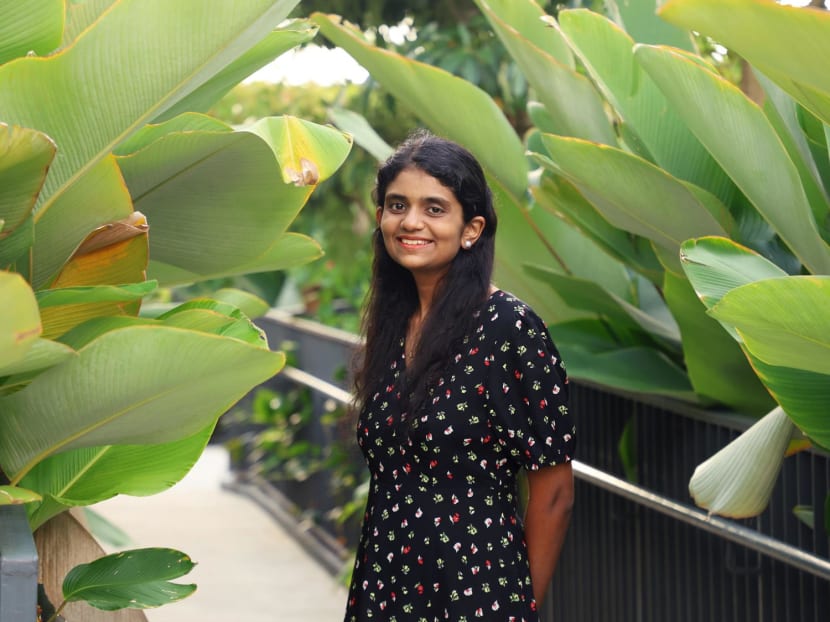Community Heroes: Helping seniors to stay active needs a lot of work, but getting the young involved has its happy rewards

Ms P Keerthana, 29, is the founder of GenLab Collective. (Photo: CNA/ Ooi Boon Keong)

This audio is generated by an AI tool.
I am a lecturer in a tertiary institution passionate about life skills education.
In late 2020, during the Covid-19 pandemic, I embarked on a journey that would change my life and, I hope, the lives of many others: The founding of GenLab Collective.
I had long been fascinated by the potential of intergenerational connections, given the very close relationships I have with my parents, who are in their 70s, and also with my grandmother who passed away in late 2020.
Her passing due to a fall had a strong impact on me, one filled with regret for not doing enough to help or support her.
My interest and passion in this space was born out of the desire to help seniors like my grandmother stay productively occupied.
When we first started, the name of our initiative was different because the focus was on building an online marketplace for seniors to share their skills, experiences and knowledge, much like the concept of home-sharing platform Airbnb.
However, after speaking to seniors in the community, we realised that this concept probably would not work out, since they would need a lot of help to get on digital platforms.
We soon learnt that places such as active ageing centres and even schools needed support in designing intergenerational programmes and activities.
This was all the more pressing given how Singapore is going to be a super-aged society by 2026 and there is an emerging need to bridge the generation gap within our community.
For the past three years, GenLab has been dedicated to fostering meaningful interactions between generations.
Our approach is rooted in co-creation and experiential learning.
We bring together seniors and youth in a variety of settings, encouraging them to share stories, skills and perspectives to build understanding, empathy and lasting bonds across age groups.
We do this through workshops and training on intergenerational communication, projects and events that bring people of different ages together.
One of our flagship events is GenDate, an intergenerational bonding event that involves people of different ages taking part in a series of curated activities designed to foster mutual understanding, empathy and kindness towards one another.
We also conduct customised intergenerational programmes for community partners and organisations.
One example of this was when we collaborated with NTUC Health and a few students from the Singapore University of Social Sciences early last year.
The students and seniors from NTUC Health’s eldercare centres came together to co-design a book showcasing the seniors’ past stories, struggles and aspirations for the future.
We curated the programme design and developed the methodology for this intergenerational storytelling series.
We also launched a new initiative called Community Conversations in June where academics and practitioners interested in promoting intergenerational relationships can come together to brainstorm and exchange ideas, facilitated by us.
Our various public events are held at least once every four to six months, but we recently scaled down the frequency to be more sustainable, given that we are a ground-up initiative in need of resources and funding.
Indeed, this has been a challenge for us from the start.
However, after putting in effort into our strategy and plans, we managed to secure funding and other forms of support from partners such as the National Youth Council, Majurity Trust, National Volunteer and Philanthropy Centre and Singapore Kindness Movement.
We also faced scepticism from some people who questioned the value of what we do.
There was one particularly memorable incident where a group of teenagers initially showed reluctance to engage with seniors.
However, after a few icebreaker activities and shared stories, the atmosphere shifted completely. The room buzzed with laughter and conversation as the different generations found common ground.
It was a powerful reminder of the transformative potential of our work.
Despite these challenges, the rewards have been immense. Seeing the joy on seniors’ faces as they connect with young people, and watching the confidence of the young persons grow as they learn from their elders, is incredibly fulfilling.
When I first started, I had two teammates. However, they were not able to continue due to other commitments and I had to start looking for other like-minded individuals to join the team.
Today, there are nearly 10 of us, with five core members — Chelsea, Hong Kai, Esther, Ananya and Tiffany — who shape our strategic plans and advocacy work.
We have engaged more than 100 seniors across all our activities since we first started.
Our biggest success so far has been the creation of our own framework for intergenerational programming and design.
However, the key challenge is about ensuring the continued impact and viability of this framework.
If you're passionate about creating positive social change, I encourage you to explore the world of ground-up initiatives.
Don't be afraid to start small. Every step you take, no matter how seemingly insignificant, can contribute to something truly meaningful.
The most powerful ideas often come from those who are willing to listen, learn and collaborate across generations. And who knows, you might just spark a movement.
ABOUT THE WRITER:
P Keerthana, 29, is the founder of GenLab Collective, a non-profit ground-up initiative dedicated to bridging the generation gap within the community through innovative intergenerational programmes, advocacy and capability building of community partners and corporations.
If you have an experience to share or know someone who wishes to contribute to this series, write to voices [at] mediacorp.com.sg (voices[at]mediacorp[dot]com[dot]sg) with your full name, address and phone number.






